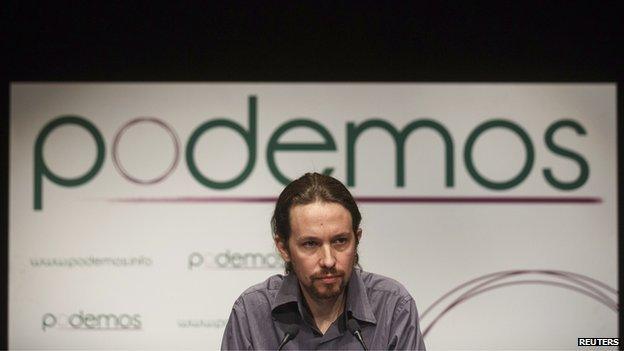Spain's 'we can' party proves it can
- Published

Podemos leader Pablo Iglesias: The new leftist party won five seats in Europe
Spain's political landscape has shifted as a result of the European elections.
That's because the complete dominance of modern Spanish politics, by the country's two main parties - the ruling conservative Popular Party and opposition Socialists - has been broken.
In the 2009 elections, between them, those two parties took more than 80% of the vote. Last night their joint share of the vote dropped below 50% for the first time in a national election in modern Spain.
So who benefited? The answer is smaller parties, particularly anti-austerity movements on the left.
The United Left coalition, linked to Spain's former Communist party, came third, with 10% of the vote.
Not a 'German colony'
But the new-kid-on-the-block here in Spain is a party called "Podemos" ("we can"). The party was only set up three months ago, but they came fourth, taking 8% of the vote.
They say they are not anti-Europe, but they are against the way the European Union has been run in recent years.
Their leader, university professor Pablo Iglesias, told me that he would fight to stop Spain being, in his words, a "German colony... and a country controlled by the Troika" - referring to the EU-IMF bailout officials.
He believes Spain needs to recapture some of its sovereignty, and that austerity has not helped reduce the record 26% rate of unemployment.
"I want to stop young Spaniards serving tapas and beers to the rich in northern Europe," he said.
Political uncertainty
Spain's Popular Party was still the biggest party, but with much less support.
And the leader of the main opposition Socialist Party has already said he will not be standing in the party's primaries, ahead of next year's general election.
So Spanish politics is more fractured and less certain.
Parties like Podemos are populist and their message will chime with a section of Spanish society. But now they have to maintain their momentum in the run-up to the general election if they are really going to alter Spanish politics in the longer term.
In Catalonia, in the northeast, pro-independence parties were the clear winners. The Catalan government wants, in November, to hold a vote on independence from Spain. Madrid says such a vote would be illegal.